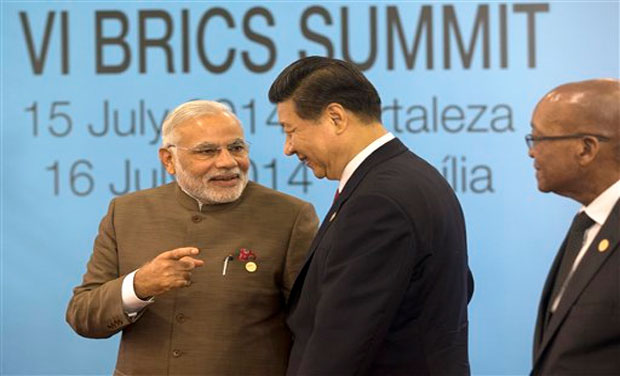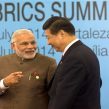
Xi Woos Modi With ‘Peace Through Development’ Approach
Publication: China Brief Volume: 14 Issue: 14
By:

On July 14, Chinese President Xi Jinping became the second national leader to meet newly elected Indian Prime Minister Narendra Modi (who has paid a state visit to Bhutan), beating Japanese Prime Minister Shinzo Abe in an 80-minute face-to-face meeting at the BRICS Summit in Fortaleza, Brazil (qstheory.cn, July 16). The message he delivered, focusing on China and India’s shared development ambitions, is an application of a theory of development-led diplomacy that Chinese leaders have put forth over the past year.
Xi’s meeting edges out Abe, who had earlier been promised Modi’s first overseas trip. While Modi may still make Japan his first state visit outside the Indian subcontinent, he has delayed a trip planned for early July to September (The Hindu, July 14). In the meantime, with the Xi meeting and a previous visit by Wang Yi, China has been making a pitch to India for a closer relationship built upon expanding economic cooperation—with two new banks to support Indian infrastructure and hints of a trade in services deal, which could help to rebalance India’s $31 billion trade deficit with China (Times of India, June 8). China currently puts strict limits on trade in services, an area in which India has an advantage.
Both Xi and Wang have drawn upon an approach to regional foreign policy first expounded at last year’s Work Forum on Peripheral Diplomacy, and since elaborated in Xi’s speech at the Conference on Interaction and Confidence Building in Asia. This approach seeks to persuade China’s neighbors that “for Asians, development is the greatest form of security”—promoting a conception of security that privileges development above other concerns and allows China to argue that its own economic growth is a major contribution to regional security (see China Brief, May 23 and June 19). The goal of this approach seems to be to ensure that economic integration outweighs territorial disputes in the strategic calculus of China’s neighbors.
India’s new government, as Jonathan Ward wrote in China Brief last month, presents China with a test of this theory: Modi harshly criticized China’s territorial claims on the campaign trail, accusing it of having an “expansionist mindset,” but has also made economic development a centerpiece of his government and evinced an interest in learning from China’s reform process (see China Brief, June 19). Both Xi and Wang have seized on the latter focus to argue that the two countries are united by their status as developing nations, and have sought to address Indian economic concerns.
At their meeting, Xi said that both countries are currently “striving for national rejuvenation,” and called for increased services trade, investment and tourism, noting that trade must be balanced to be sustainable—an observation happily endorsed by India’s foreign ministry spokesman (qstheory.cn, July 16; Indian Ministry of External Affairs press briefing, July 15). Wang likewise emphasized shared dreams of national renewal (PRC Foreign Ministry, June 9). Both mentioned the territorial disputes, but did not offer anything new—relegating the issue to the end of their speeches and saying that existing frameworks are sufficient to manage the dispute.
China has also deployed international organizations to woo India, inviting it to join the Asian Infrastructure Investment Bank, proposed last year, which will further economic ties both by direct investment and by facilitating further trade in physical goods (qstheory.cn, July 16). A deal announced at the summit to create a BRICS development bank headquartered in Shanghai and initially led by an Indian President will help with the same goals (Times of India, July 16). Xi also invited Modi to attend a November APEC summit hosted by China, which will be India’s first appearance at that forum, and reportedly told Modi that he “looks forward to working more closely with India at the Shanghai Cooperation Forum,” a China-initiated organization at which India has been denied full membership (Indian Ministry of External Affairs press briefing, July 15).
But Modi is also clearly concerned about traditional security issues, focusing on them in a statement released at the opening of the BRICS summit. He mentioned terrorism, Afghanistan, the current wars in the Middle East and North Africa and cyber-security, but not territorial disputes (NDTV, July 15). Likewise, he is apparently interested in maintaining a close relationship with Abe despite the growing tensions in Sino-Japanese ties.
China is unlikely to shelve its territorial disputes in pursuit of trade—while rolling out the peripheral diplomacy strategy in Southeast Asia, China has not avoided confrontations in the South China Sea, placing an oil rig in Vietnamese-claimed waters and sending navy ships to visit a reef in waters disputed with Malaysia during an exercise in February. The oil rig ended drilling on July 15, somewhat earlier than the originally stated schedule of drilling into the middle of August. Instead, Xi argues that the benefits of development will simply outweigh other types of security.
But this theory may work both ways: Xi has argued that it is possible to decouple economic cooperation from territorial and strategic confrontation. While he has made progress toward forging a close business relationship with Modi, there is no guarantee that it will translate into politics.





